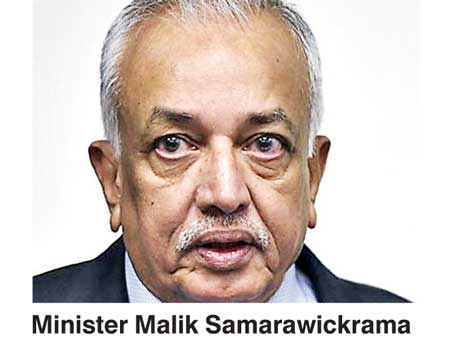Thursday Feb 19, 2026
Thursday Feb 19, 2026
Friday, 27 January 2017 00:00 - - {{hitsCtrl.values.hits}}
 Minister of Development Strategies and International Trade Malik Samarawickrama yesterday issued a lengthy statement correcting what he described as misleading and incorrect information in media articles relating to the project to manufacture radial and solid tyres at Wagawaththa Industrial Zone, Horana.
Minister of Development Strategies and International Trade Malik Samarawickrama yesterday issued a lengthy statement correcting what he described as misleading and incorrect information in media articles relating to the project to manufacture radial and solid tyres at Wagawaththa Industrial Zone, Horana.
“The statement made by (Minister and Cabinet Spokesman) Rajitha Senarathne on this issue is also incorrect,” said the announcement by Minister Malik’s office.
Following is the full text of the statement:
It is necessary to emphasise the fact thatboth His Excellency the President and the Hon. Prime Minister were aware of the investor since I, myself, informed them well in advance.
Furthermore, two Cabinet papers, i.e.initially one proposing the land and then giving details of the incentives and other terms, were submitted on this project and in addition the project was discussed and endorsed at several meetings of the Cabinet Committee on Economic Management.
The statement that the land was given for Rs.100per acre is incorrect. In fact, the Government Chief Valuer had valued the land at Rs. 170,825,000and the investor has agreed to pay the total amount upfront. The Chief Valuer has also indicated that a further Rs. 10,000be charged as an annual nominal fee. Further details pertaining to the project are given below.
The 100-acre land at Horana, Wagawaththa Industrial Zone is a bare undeveloped land undulating in most areas. Based on the technical investigations done by Central Engineering and Consultancy Bureau (CECB), it is noted that the investor has to incur a sum of about Rs.300 to 400 million as per the estimate to bring the land to a usable state. The investor claims that around 3m layer of weak soil has to be removed throughout 25 acres of this land.
The BOI is not providing any infrastructure facilities like in other zones – e.g. even the waste disposal treatment plant will be constructed by this investor. Similarly, all internal roads will have to be constructed by the investor.
Based on valuation of land by Government Chief Valuer – an upfront payment of Rs. 170 million is to be paid by investor. Since the project requires a large extent of land, the investor requested the land be leased to him based on the valuation determined by the Chief Valuer on the basis that infrastructure will be provided by him.
The said request by the investor was accommodated by us in view of the high value of the investment of the project and the significant contribution expected to the economy particularly linked with the rubber industry.
The BOI should promote investment and if necessary regulations and rules need to be changed to attract investments as the current regulations have failed to bring in investors. The FDI in 2015 was $ 970 million and in 2016 it will be around $ 450 million, which is extremely low by any standard.
The total investment of this project is $ 75million (Rs. 11.25 billion). The project will employ around 3,000 people. It will add value to the rubber produced in Sri Lanka and convert raw rubber to radial and solid tyres. The annual export earnings will be above $ 125million.
There will also be inward transfer of technology as the Italian company Marangoniis expected to provide the technical know-how to produce tyres and other rubber-based products.
There are similar BOI projects, on BOI-owned properties, which have been given on long-term lease with an upfront payment and an annual fee is not charged from such projects – e.g. MAS Group given 47 acres on 50-year lease and upfront payment is to be received and no annual fee is charged. This was a well-developed property with buildings and other infrastructure, although major repairs/renovations will have to be undertaken by the investor (former Kabool Lace property).
Furthermore, a land vested by BOI in Kuliyapitiya was given on a freehold basis to Western Automobile Assembly for a proposed vehicle assembly plant. The BOI has also granted 357 acres in the same area on a 99-year lease for $ 1 per acre per annum to Merbok, in settlement of a dispute arising from a contract signed in year 2000.
All expenses in developing this land, includingconstructing a treatment plant, internal roadways and obtainingtransformers, etc. will be on account of the investor. Therefore, this project should be considered on the same basis as the MAS project.
This investor applied to set up the plant inMarch 2016 when they were eligible for the tax concessions under BOI.
Initially, BOI took steps to acquire a private land in Horana but since the owners of that land were unwilling to sell this property BOI was instructed not to acquire that land as per this President’s observation on Cabinet Paper No. MODSIT/3/CAB/16/8 dated 2016.06.02.
We believe the investor should not be penalised for this delay on the part of BOI to make available the land. Accordingly a Cabinet Memorandum was submitted on 2016.10.03 identifying the BOI-owned land at Wagawaththa and explaining this position.Accordingly approvalwas granted by the Cabinet on granting the tax concessions prevailing at the time of the application.
It is worth to mention that in different countries promoting investment projects, various mechanisms exist for lease of land and providing infrastructure on case by case basis, based on evaluation of salient features of the project, level of infrastructure required, extent of land, etc. In India, in certain states land is given for one Indian Rupee per acre per year to attract investors.
When proposals for investments are received we do not look at the political affiliations of the investor and projects are evaluated and approved on the basis of economic and social benefits to the country.